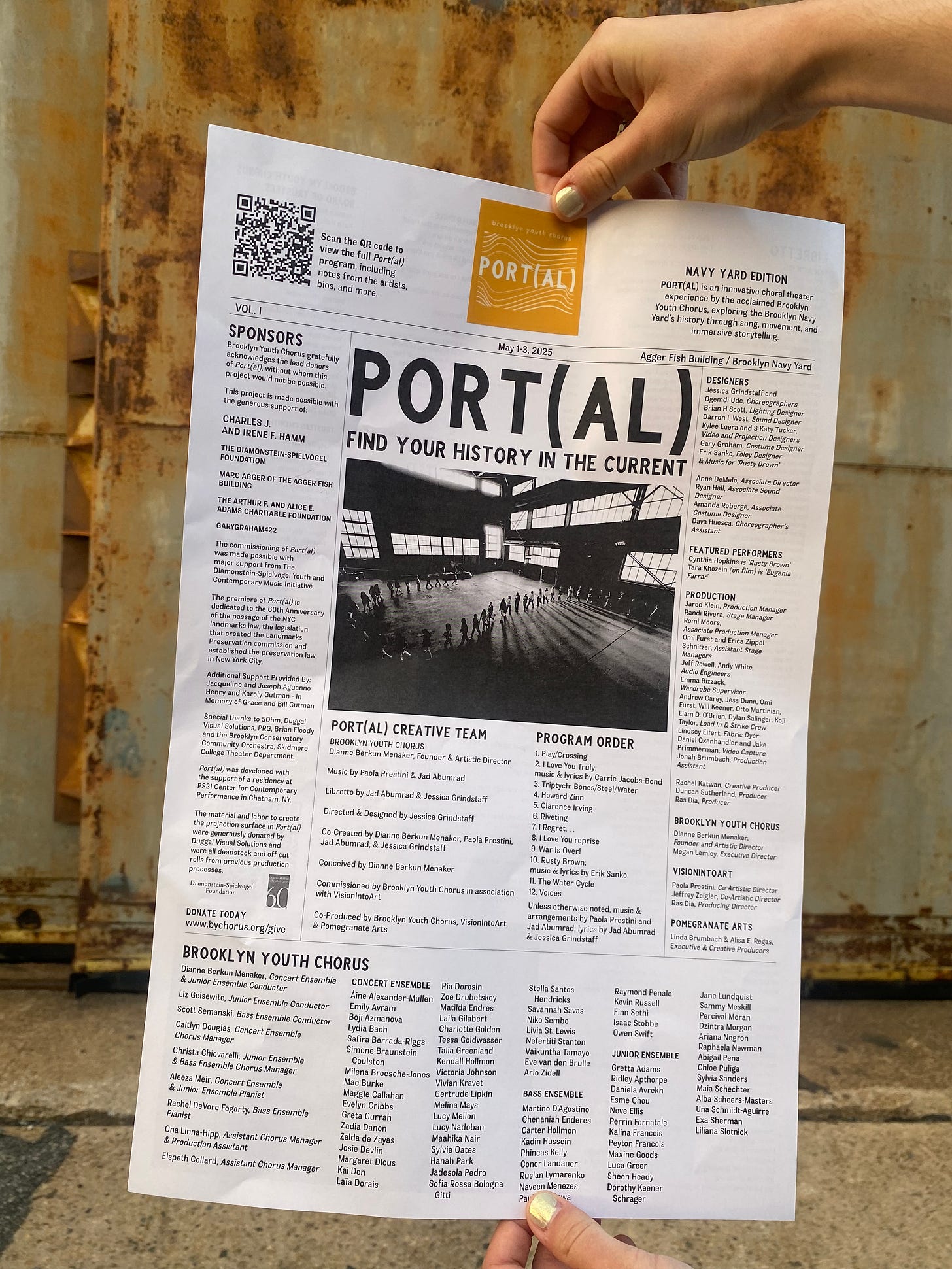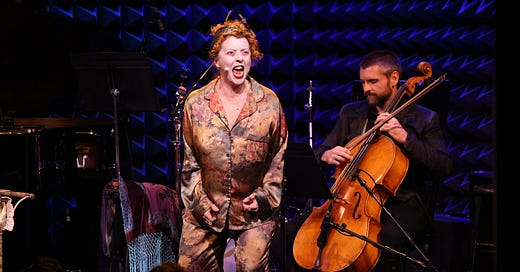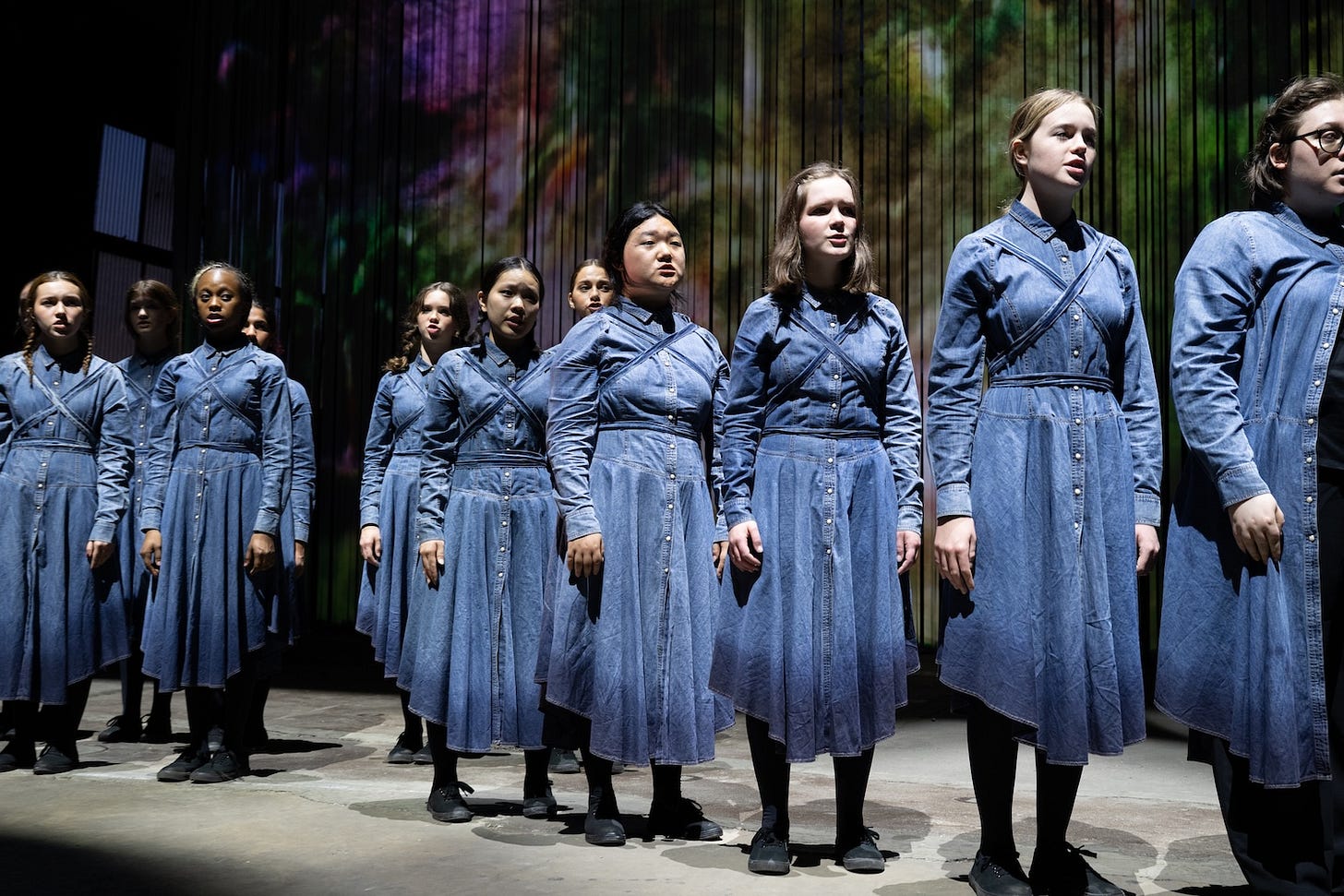Filling the Void
LUCINE! or birdshit — described as a “human concerto for string and void,” by composer Christian De Gré Cárdenas — is certainly virtuosic. In it, actor Bethany Geraghty, eyes bloodshot and in silk pajamas, performs a multi-voiced recitation, taking us through different movements and themes.
But in this concerto, the conversation is not between the soloist and orchestra, or even between Geraghty and cellist Eric Eaton, but between Geraghty and herself.
One woman shows seem to be in right now. (Sarah Snook is currently Dorian Gray on Broadway.) But without costume changes, the fast-paced LUCINE! was difficult-to-follow, feeling a little like a soliloquy by someone with multiple personalities. I found it easiest to understand when hearing just one side of Lucine’s conversation on the “phone.”
But perhaps this was just me, because at Joe’s Pub last Tuesday, LUCINE! elicited more than just polite chuckles from the audience.
LUCINE!, representing Greed, is part of Cárdenas’s seven deadly sins cycle. (Cárdenas is also the executive director of Heartbeat Opera.) Throughout, Geraghty channels different characters: Elio, Rahuil, Solana, Finnegan (who might be a dog?), a hotel receptionist named Tuba (“like the instrument”), Luna (the protagonist’s mother, who reminded me of Moira Rose from Schitt’s Creek).
Beneath Geraghty’s spoken line, Eaton’s felt a bit like wallpaper. The cello score resembled a challenging étude, with repeating pizzicato and arco figures, reminiscent of Philip Glass Songs and Poems for Solo Cello. I wanted more from Eaton, who seemed more than technically capable.
It was only during Geraghty’s interludes about the moon, with poetry by Joseph Reese Anderson, that a rare cello melody could be appreciated. In terms of concept and instrumentation, LUCINE! had similarities to the INcomplete Cosmicomics, which I saw in March, though overall it was perhaps less successful.
Hope(ful)
The rusted doors of the Agger Fish Building opened with a metallic creak. In the cavernous warehouse, singers from the Brooklyn Youth Chorus played hopscotch and double dutch in matching denim dresses, like an eerie Bill Viola film.
This was the beginning of Port(al), a site-specific choral work about Brooklyn’s Navy Yard, by composer Paola Prestini. Though Port(al) was written for young singers, there was nothing toned-down or unsophisticated about it.

The libretto, by Jad Abumrad and Jessica Grindstaff, chronicled the Navy Yard’s history, sparing no detail. Especially moving was “Bones,” about the bodies of those who died aboard Revolutionary War prison ships upon which the Navy Yard was built. “We stand on bones,” sang the chorus. “Two million three hundred and sixty-nine thousand bones, to be exact.”
Prestini’s score had, at times, a medieval feel, with a cello-like boat horn, and rhythmic striking of the walls in “Steel.” Like a whisper from the past was Tara Khozein’s haunting rendition of “I Love You Truly,” based on the first live radio performance by opera singer Eugenia Farrar. (This performance was overheard by a radio operator docked at the Navy Yard, who thought it was an “angel.”)
The accordion-playing Cynthia Hopkins, as the ghost of drag king Rusty Brown, provided some cabaret-style comic relief. On moving moment, though, was when Rusty asked a small concertgoer near the front “How old are you?” When she replied, “Five,” he rejoined, “I’ve been dressing like a boy since I was younger than you.”
In the end, Port(al) is an anti-war requiem. There were moments when I wanted to shield these young people from engaging with such heavy material. But then, in one interlude, Youth Chorus members reflected on opening social media only to be bombarded with images of violence. There’s no shielding.
And hearing the fresh-voiced soloists sing, with rising four-note scalar figures, “Never again, never again” and “I feel hopeful, I feel hopeful,” for a moment, I did too.
Coming down the pike:
Ruckus Baroque Ensemble plays at the newly-renovated Frick on Thursday, May 8
Joseph Keckler shows us “A Good Night in the Trauma Garden” at the Met on Friday, May 9 and Saturday, May 10
Awadagin Prat performs at the 92nd Street Y on Sunday, May 18
Azalea Twining and Anna Helfin present works at the MATA Festival on Tuesday, May 20
Alisa Weilerstein performs “Fragments 3” at Zankel Hall on Tuesday, May 20
Brooklyn Rider plays Philip Glass’s Complete String Quartets at the Met Cloisters from Wednesday, May 21 through Friday, May 23
Death of Classical serves up “Cocktails, Comestibles, and Callas” at Green-Wood Cemetery on Friday, May 23
“The Counterfeit Opera” opens at Little Island on Thursday, May 29 running through mid-June








Dear Max,
Thank you for attending and for sharing your perspective. I do think there may have been a misunderstanding of the piece—it’s not a one-woman show, nor was it intended to be. If that was unclear, I’ll take partial responsibility as the creator for not making that structure more apparent.
However, I do want to note that your review includes several factual inaccuracies, including the incorrect citing of my name, misidentified and misspelled characters, and the wrong title of the work. Happy to have a conversation over coffee or drinks to discuss, if you're up for it.
With gratitude,
Christian
Thank you for your thoughtful response and your grace, Max. I truly appreciate it. It’s certainly a strange piece to describe, and I have a lot of empathy for anyone being thrown into that world and expected to make sense of it quickly.
There’s no need for formal corrections—I just felt it important to gently note a few details that may seem minor but are actually quite significant in framing the piece. For instance, it is a “human concerto with string and void,” not “for string and void.” That may sound subtle, but the phrasing is intentional and speaks to the structure and absence at the heart of the piece.
She is the opera, the accompaniment is a singular string and the void around it. The cello was never meant to carry a melodic line on its own. It is part of a larger ensemble—represented by six other instruments that were set up, miked, and unplayed because those musicians were “exhausted” by Lucine herself during “sound check.” So, what we witness is a single cellist doing what he can to support her in that newfound void. Similarly, the empty reserved signs in the front row represent the other “actors/patrons” who never showed up.
I’m not writing at all to argue your opinion—I’m genuinely grateful you made the time to attend and engage with my work. I’ve long respected your writing and your insight. I simply feel I may have failed to set up the world clearly enough, and that some of the intentionality behind the piece may have been missed.
I adore and respect creative feedback, thanks for indulging me.
Looking forward to when our paths cross again!